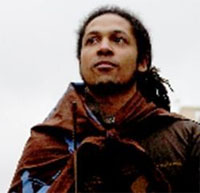|
Intermix.org.uk is a website for the benefit
of mixed-race families, individuals and anyone who feels they have a multiracial
identity and want to join us. Our mission is to offer a view of the mixed-race experience, highlighting icons, film, books, poetry, parenting techniques, celebrities, real lives and much more. Our online forums are a great place to meet others, ask questions, voice your opinions and keep in touch. Sign up for our monthly newsletter and delve into our pages. Want to join in? Become an Intermix member to take part: |
Black And White Doesn't Do The Trick
Toby Laurent Belson

Black and White doesn't do the trick.
It does not come close to doing the trick.
The trick is to describe a person without resorting to a longwinded sentence.
Describe that person as 'Black', and what do you get?
Describe the person as 'White' and now what do you get?
The shockingly disparate dictionary definitions alone would convince any sensible person not to apply these descriptions to people, especially in those parts of the world where the African and Asian Diasporas have lived and integrated for well over four hundred years. It is a recipe for division and misrepresentation.
I am very proud to have been born on the 25th of March. It is a constant reminder to me that precisely One Hundred and Seventy years previous to my birth, Britain brought in an Act to cement a political decision to end its direct involvement in the Transatlantic Slave Trade. I now feel that I, along with the rapidly increasing members of the mixed race community, are the living, breathing outcome of that despicable Trade and that righteous decision.
If you have grown up around an area with cultural and racial diversity, as I have in West London, you may agree that the polarizing descriptions and stereotypes that follow the terms 'Black' and 'White' do not do justice to the people you know.
So why do we continue to use words that are loaded by a history full of opposites and destruction to describe a people of the future, created by togetherness and common individuality?
As I grew up I encountered a fresh kind of racism, to go with the old. I would be told by peers of Afro-Caribbean descent that I was a 'coconut'(Black on the outside-surely brown, no?- white on the inside). Then told by Caucasian peers that they were 'blacker' than I.
I know now that these comments were born of ignorance, and racist presumptions of what it was to be 'black' or 'white'. As a child and a teenager the perceptions of others twisted and turned my own beliefs, tempting me to prove myself as 'black' - sporty, musical and hard fighting-or 'white' - erudite, responsible and hard working.
Even then, these stereotypes of black and white would be affected by my own experiences of having a middle class white mother and an absent black Caribbean father-do not make the prejudiced mistake of presuming that he walked out, he did not.
Did this playground logic mean that the Prime Minister of Jamaica was white on the inside-or did his Jamaican accent overshadow his education? Of course it did, since the way you spoke was a huge indicator of your place in society, far more important than what you said. Was Vanilla Ice black on the inside-at least until his middle class upbringing was revealed? This never felt right, since how could you be black if you could wear a suit and be considered white again? Did this mean that all middle class people were white? Did this mean that all black people were working class? Was blackness and whiteness something interchangeable? By immersing myself in popular black culture-hip hop, ragga, jungle, Eddie Murphy, boxing and athletics- could I clear up the confusion? Was there truly such a distinction between what was inside and what was outside?
White people rarely describe themselves as 'white'. They describe themselves as what they are by current nationality or cultural heritage. English, Scottish, Irish, French, Italian, Greek, European, American. It instills a sense of pride and grounding, a sense of identity based on where they are and where they and their parents have come from.
So when it comes to those people of African descent, how can we allow the political - and to some extent the pop-cultural - to so radically affect the factual?
It appears to me that this labeling of people, in a western culture so obsessed with status and branding, is damaging to all of us, denying a complex and adaptable society the opportunity to leave basic stereotypes behind.
It is a powerful legacy of the Slave Trade. It prevents us from dealing with the real issues of real people, by ignoring the realities of our shared history and individual heritage. It blanks out the differences that make our experiences so important for one another to learn about and understand.
'Black and White' is further evidence of the 'dumbing down' of our society, where making people think and formulate ideas for themselves seems to be a threatening concept, one that does not promote inclusion and equality. Perhaps this is because our society's system of education and employment does not truly promote inclusion and equality despite the best efforts of a handful of people. This reality has left many people, particularly those of minority groups and poorer backgrounds short of the basic skills or resources required to think and formulate ideas for themselves. Or so we think. Perhaps it is the strength of the singular message, the wish for the ultimate definition, undeniable with its simplistic, binary weight and power that has us all in thrall to 'Black and White'.
This paper was first submitted as part of the e-conference mixedness and mixing 4-6 September 2007.
